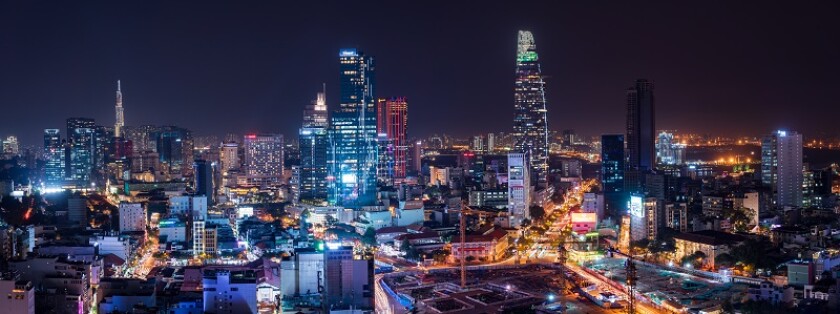Mark Anthony Fraser and Stefano Pellegrino, Frasers Law Company
SECTION 1: Market overview
1.1 Please provide an overview of the project finance market in your jurisdiction.
The project finance market in Vietnam is quickly entering into a new phase, with some major projects finally entering the development and construction stage, while a solid pipeline of new infrastructure and energy projects is rapidly entering the negotiation stage. Most project financing structures still tend to be led by the multilateral agencies, with a heavy focus in the energy sector.
1.2 What is the composition of the market in terms of the types of active lending institutions and has this been evolving?
There are no official statistics on the composition of the market in terms of the types of active lending institutions for projects in Vietnam. Major foreign institutions such as the Japan Bank for International Cooperation (JBIC) and the Export-Import Bank of Korea (K-Exim) have been significant providers of project financing in Vietnam for some time. We are also seeing increasing interest in the infrastructure sector from PRC sponsors, along with support from PRC lenders. However, in addition to foreign credit institutions and other offshore lenders who are traditional providers of project financing, local commercial banks are now becoming more active in the market. It should be noted that under Vietnamese law, land use rights and assets attached to the land can only be mortgaged to Vietnamese credit institutions, which means that foreign lenders are prohibited from taking security interests over immovable property. The increasing involvement of local commercial banks in the project finance market is therefore a good signal for potential investors.
1.3 Please describe any major current projects or initiatives that are influencing activity.
On June 3 2017, a major build-operate-transfer (BOT) coal fired power project, known as Nghi Son 2, was awarded an investment registration certificate (IRC) and is now rapidly moving through to the last stages of the negotiation phase, with financial close expected later this year with construction due to commence shortly thereafter. Other BOT power generation projects ongoing and upcoming in Vietnam include Song Hau 2 (in respect to which the IRC is expected to be issued soon), Vung Ang 2 (in respect to which the investment agreement was signed on January 16 2017), as well as Duyen Hai 2, Vinh Tan 3 and Vinh Tan 4, Long Phú 2, Son My 1, Van Phong 1 and Kien Luong 1.
The Government also recently approved a master plan to develop a 3,000MW gas-fired power project located in Quang Nam province which will be powered by the natural gas extracted from the Blue Whale offshore gas fields located off the coast of central Vietnam.
SECTION 2: Transaction structures
2.1 Please review some recent notable transactions involving your market and outline any interesting aspects in their structures.
Most of the projects mentioned above are being implemented within the private-public partnership (PPP) framework in Vietnam in order to mobilise capital from international lending institutions. However, lenders commonly face a number of restrictions when securing their loans with assets located in Vietnam. In particular, as mentioned above, land use rights and assets attached to the land can only be mortgaged to licensed Vietnamese credit institutions. In the context of major infrastructure projects (for example, thermal power plants), the project company would typically mortgage the land use rights and assets attached to land to a licensed credit institution within the syndicate on behalf of the lenders. Lenders would obtain comfort from this structure through a government guarantee issued by the Government, supported by a confirmation by the State Bank of Vietnam, a legal opinion issued by the Ministry of Justice (MOJ) and by specific acknowledgments and consents issued by the relevant Ministries and key local authorities involved in the project.
2.2 What might the projects above mean for the market and have you noted other noteworthy developments in the way project finance transactions are being structured for a) energy projects and b) infrastructure development?
The Vietnamese Government aims to develop a solid pipeline of PPP projects to support the fast economic growth in Vietnam. It is encouraging for international investors that projects of the importance of Nghi Son 2 are moving forward. By successfully implementing a greater number of PPP projects, the Vietnamese Government, Ministries and officials are becoming increasingly familiar with these kind of structures, and the project documents and procedures necessary for such projects are slowly becoming more standardised and streamlined.
SECTION 3: Legislation and policy
3.1 Describe the key legislation and regulatory bodies that govern project financing in your jurisdiction.
The Law on Investment 67/2014/QH13, passed by the National Assembly on November 26 2014 (Law on Investment) is the cornerstone of Vietnamese legislation with respect to project finance, and contains the basic principles and protections applicable to foreign investors in Vietnam.
In addition, Decree 15/2015/ND-CP dated February 14 2015 of the Government on investment in the form of PPPs (Decree 15) and its implementing legislation provide a detailed regulatory framework with respect to the award and implementation of PPP projects in the form of BOT contracts, build-transfer-operate contracts (BTO), build-transfer contracts (BT), build-own-operate contracts (BOO), build-transfer-lease contracts (BTL), build-lease-transfer contracts (BLT) and operate and manage contracts (OM). It should be noted that Decree 15 is currently under review and a draft decree has been circulated which it is anticipated will replace Decree 15.
The authorities mainly involved in the set-up and implementation of major infrastructure and energy projects are the Prime Minister, the Ministry of Industry and Trade, the Ministry of Planning and Investment, the Ministry of Transportation and the State Bank of Vietnam.
3.2 Have there been any recent changes to regulations or regulators that may impact the finance structuring in terms of guarantee and security regimes, local currency rules and foreign investment restrictions?
The latest major regulatory change with respect to guarantee and security regimes, local currency rules and foreign investment restrictions occurred in 2015 with the promulgation of Decree 15 on PPP. However, as stated above, throughout 2017, the MPI has been discussing a draft decree on PPP that is intended to entirely replace Decree 15. We note that the level of support provided under government guarantees is not as extensive as that provided under the early BOT power generation projects such as Phu My 2.2 of a decade ago.
Further sector-specific changes were implemented in 2017 with respect to solar power projects, and are discussed in the paragraphs below.
3.3 Please describe the regime governing renewable energy investment.
There is currently no unitary renewable energy regulation in Vietnam. However, the Law on Energy Efficiency and Conservation 50/2010/QH12 which took effect in 2011 and the Electricity Law 28/2004/QH11, as amended by Law 24/2012/QH13, have helped to establish a framework for meeting longer-term renewable energy development targets. In addition, in 2016, the Government also issued the revised 7th Power Development Plan for 2011 to 2030 (Revised PDP 7) placing a strong emphasis on renewable energy.
With respect to the wind power sector, Decision 37/2011/QD-TTg (Decision 37) dated June 29 2011 provides a feed-in tariff mechanism (generally offered at $0.78/kWh) to support the development of wind power projects in Vietnam.
With respect to the solar power sector, on April 11 2017, the Prime Minister of Vietnam issued Decision 11/2017/QD-TTg on the mechanism for encouragement of the development of solar power projects in Vietnam (Decision 11), which finally provides the first cornerstone of the regulatory framework necessary for Vietnam to develop its production of solar energy, and provides for a feed-in tariff (being $0.935/kWh) for a period of 20 years to solar power projects that will start commercial operations before June 30 2019.
Both Decision 37 and Decision 11 also provide for power purchase agreement (PPA) templates applicable, respectively, to wind and solar power generation projects, according to which EVN shall purchase the electricity generated from solar and wind power producers. Parties to the standard PPA may add terms and conditions to the applicable template in order to clarify the rights and obligations of the parties, but they are not permitted to modify the main contents of the templates.
3.4 Does your jurisdiction have incentive schemes in place for various types of energy or infrastructure project development?
Decree 15 provides for several incentives applicable generally to energy/infrastructure projects, such as: corporate income tax (CIT) incentives (depending on the nature of the specific project); import tax incentives for goods imported for the execution of the project; and exemption or reduction from land use fees/land rent for the duration of the project implementation. In addition, pursuant to Decree 15, PPP projects may be entitled to obtain a Government guarantee and assurances with respect to a number of key issues such as foreign currency availability, land use rights and ownership of assets.
Under the Law on Investment, the production of renewable energy is regarded as a preferential investment industry and is therefore entitled to a number of tax incentives, including: CIT at 10% for 15 years; possible tax exemption of up to four years starting from the first profitable year; possible tax reduction of 50% for up to nine years after the end of the exemption period; and land rent exemption (if payable) for three years.
In addition, further specific incentives and feed-in tariffs are also available for specific renewable energy sectors. For example, the newly issued legislation on solar energy provides foreign investors with crucial incentives for investing in solar power projects, including: a clear obligation for Electricity Vietnam (EVN), which is Vietnam's state-owned electricity company, to purchase all of the electricity produced by the sellers who meet the conditions for investment in solar power projects specified under Decision 11; feed-in tariffs for solar electricity of VND2,086/kWh (equal to $0.935/kWh, exclusive of VAT), with the price to be adjusted according to the exchange rate between Vietnamese dong and US dollars at the time of payment; import tax exemption for goods which serve the implementation of the project, but cannot be produced inland; and corporate tax incentives and land use fee incentives applicable to all renewable energy projects (as outlined above).
3.5 Are there any rules, legislation or policy frameworks under discussion that may impact project finance in your jurisdiction?
Throughout 2017 the MPI has been discussing a draft decree on PPP that is intended to replace Decree 15. The draft decree aims to provide a more simple and streamlined procedure for the implementation of PPP projects (removing, for example, the requirement for investors to obtain an IRC) but also for higher minimum equity requirements to be maintained by investors in PPP projects (now ranging between 15% and 20%, depending on the entity of the project).
The MPI is also exploring whether to migrate the PPP legislation into a special PPP law, which would have a higher legislative ranking than the current decree, and would therefore resolve potential discrepancies between PPP regulations and provisions contained in other laws.
In December 2017, the Ministry of Finance (MOF) has also published a draft decree on the issuance and management of government guarantees for domestic and foreign loans and bond issuances, which is supposed to be issued during the course of 2018 and aims to better control public debt by introducing a stricter regime on Vietnam's sovereign guarantees.
SECTION 4: Market idiosyncrasies
4.1 Please describe any common mistakes or misconceptions that exist about the project finance market in your jurisdiction.
Enforcement of foreign arbitral awards
Vietnam ratified the 1958 New York Convention on the Recognition and Enforcement of Foreign Arbitral Awards on 28 July 1995 (the New York Convention).
Although in theory it should be possible to enforce a foreign arbitration award in Vietnam through the Vietnamese courts, proceedings through the courts of Vietnam can be highly unpredictable and the outcomes unsatisfactory since there is no system of jurisprudence or binding precedent in Vietnam. As far as we are aware, very few foreign arbitral awards have been enforced through the Vietnamese courts to date and the system remains largely untested. Vietnamese courts will not recognise and enforce foreign arbitral awards if they believe that they are 'contrary to the basic principles of Vietnamese law'. Such legislative exception to the recognition and enforcement of foreign arbitral awards has been widely interpreted by Vietnamese courts. In practice, based on the statistics available from the courts, less than 50% of arbitral awards issued by foreign arbitration tribunals have been successfully recognised and implemented in Vietnam.
Sovereign immunity
Another idiosyncrasy derives from the fact that there are no express provisions under Vietnamese law which establish a principle of sovereign immunity or indicate that Vietnamese Government Authorities can claim for themselves or their assets immunity from suit, attachment, execution or other legal process.
4.2 What measures should be taken to best prepare for your market idiosyncrasies?
Comfort should be sought from the relevant Vietnamese Government authorities in relation to the recognition and enforceability of foreign arbitral awards in Vietnam, as well as in relation to the validity of the waiver of sovereign immunity by the relevant Vietnam governmental bodies usually contained in project documents. Certain comfort could be obtained in the form of a legal opinion issued by the Ministry of Justice specifically covering these matters.
SECTION 5: Practical considerations
5.1 How established is the legislative framework and authorities that govern public-private partnerships (PPP) and where have PPP structures most successfully been applied?
The legislative framework that governs PPPs is still being developed. Infrastructure projects undertaken in the form of BOT projects (primarily in power generation) have been the most common form of PPP projects undertaken to date, although there is a tendency of certain Vietnamese government authorities to only think of PPPs in the form of BOT projects. The authorities involved still need to fully familiarise themselves with PPP structures and with international project finance practices. Nevertheless, the relevant Ministries are very active on this front, organising meetings and seminars with top-level foreign PPP experts. In addition, most Ministries actively seek the comments and inputs of business associations and other stakeholders on their draft legislation, and are often receptive of the comments received.
5.2 What are the key considerations relating to foreign investment into projects as regards insurance and tax structures?
As a general proposition, within the territory of Vietnam, except in certain limited cases where the use of foreign currency is permitted (Exception Cases), all transactions, payments and recording of prices in contracts and agreements of residents and non-residents are not permitted to be conducted in foreign currency (Article 3 of Circular 32/2013/TT-NHNN).
Thus, from an insurance perspective, claim payments under onshore insurances (ie where the insurance contract is entered into between a Vietnamese domiciled company, such as a BOT Company, and an onshore insurer) have to be paid in Vietnamese dong, except in a few instances that fall within the Exception Cases.
From a tax structuring perspective, given potential capital gains tax issues, it is important to consider the potential (partial) divestment of an interest in a foreign invested project in Vietnam. Therefore, consideration should be given to the relevant jurisdiction in which an offshore investor in a Vietnam infrastructure project is incorporated, taking into account any relevant avoidance of double taxation treaties which might have been entered into between Vietnam and such jurisdiction.
In addition, as mentioned above, foreign investors should consider closely the tax (and other) incentives which might be offered in relation to investment in an infrastructure project in Vietnam.
5.3 Are there any specific issues creditors should be mindful of regarding a bankruptcy and restructuring scenario?
In the case of a Vietnam incorporated company becoming bankrupt, the realisation of the secured assets of the company would be temporarily suspended, unless the relevant Vietnamese Court permits otherwise.
Under the Law on Bankruptcy, if a judge issues a decision to commence liquidation proceedings against the company, debts which were secured by assets mortgaged or pledged prior to the Vietnamese Court accepting jurisdiction over a petition to commence bankruptcy proceedings shall be entitled to priority payments from such assets. If the value of the mortgaged or pledged property is insufficient to pay the amount of the debt, then the outstanding part of the debt shall be unsecured and shall be payable during the liquidation process of the assets of the company. If the value of the mortgaged or pledged property is greater than the amount of the debt, then the difference shall be included in the value of the remaining assets of the company. The asset management team shall realise the secured assets and undertake the priority payments to the secured creditors.
SECTION 6: Outlook
6.1 What are your predictions for the next 12 months in the project development and financing sector and how do you expect legal practice to respond?
The outlook for the next 12 months in the project development and financing sector is very positive. The Vietnamese government is seeking to achieve a fast and smooth completion of the negotiation phase with respect to some major PPP projects, and has built a solid pipeline of new projects. Much will depend on implementation and on whether the government will be able to meet its proposed timeline for completion of the key projects. We expect to see a focus on renewable energy projects, as result of last year's legislation focusing on wind and solar energy projects.
About the author |
||

|
|
Mark Anthony Fraser Managing partner, Frasers Law Company Ho Chi Minh City, Vietnam T: + 84 28 3824 2733 F: + 84 28 3824 2736 Mark Fraser is managing partner of Frasers Law Company. Fraser has more than 25 years' experience advising clients from all over the globe (while being based in Ho Chi Minh City, London, Singapore, Bangkok, Hong Kong and Auckland), and has been advising clients on project finance transactions in Vietnam since 1994. In the 23 years that Fraser has been based in Vietnam, his practice has focused on infrastructure projects and project finance, banking and finance, restructuring and insolvency. This involves debt and equity structuring of investment projects and the preparation and negotiation of documents. Fraser has been involved in numerous power generation, water treatment, telecommunications, road toll way, and oil and gas projects in various jurisdictions within Asia and has advised on a number of Vietnamese matters in the banking and finance, corporate and commercial, infrastructure, capital markets and dispute resolution areas. Fraser is recognised as one of Vietnam's top leading lawyers by The Legal 500 Asia Pacific, and Chambers Asia Pacific and Chambers Global, Asialaw Profiles and IFLR1000. |
About the author |
||

|
|
Stefano Pellegrino New York attorney, Frasers Law Company Ho Chi Minh City, Vietnam T: + 84 28 3824 2733 F: + 84 28 3824 2736 E: stefano.pellegrino@frasersvn.com Stefano Pellegrino is a dual-qualified attorney (Italy and New York). He graduated magna cum laude from University of Pavia, School of Law (Italy), and earned a master of laws from University of California, Berkeley, School of Law (USA), with a focus on cross-border contracts. He received his doctorate of law in 2012 from the University of Pavia, School of Law (Italy), and completed post-doctoral research at New York University (USA) and at the Max Planck Institute for international private law in Hamburg (Germany). In Vietnam, Pellegrino has been advising major international clients on high-value cross-border corporate transactions and has built up strong experience in project finance and infrastructure projects (including several multi-billion-dollar BOT power generation projects). |


